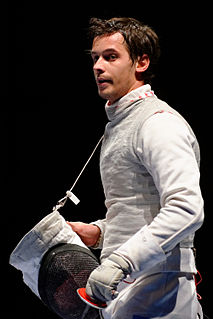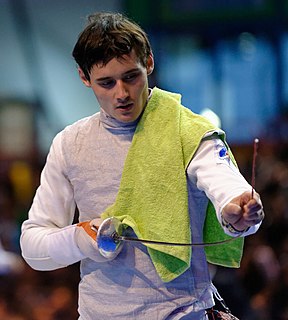
Fencing is a group of three related combat sports. The three disciplines in modern fencing are the foil, the épée, and the sabre; winning points are made through the contact with an opponent. A fourth discipline, singlestick, appeared in the 1904 Olympics but was dropped after that, and is not a part of modern fencing. Fencing was one of the first sports to be played in the Olympics. Based on the traditional skills of swordsmanship, the modern sport arose at the end of the 19th century, with the Italian school having modified the historical European martial art of classical fencing, and the French school later refining the Italian system. There are three forms of modern fencing, each of which uses a different kind of weapon and has different rules; thus the sport itself is divided into three competitive scenes: foil, épée, and sabre. Most competitive fencers choose to specialize in one weapon only.

Historical European martial arts (HEMA) refers to martial arts of European origin, particularly using arts formerly practised, but having since died out or evolved into very different forms.

The English Institute of Sport is a multi-sport facility in Sheffield, England. The facility designed by FaulknerBrowns Architects was opened in December 2003 at a cost of £24 million. Its main feature is a 200m indoor track, but it also hosts several other sporting arenas as well as a large gym and extensive sports medicine facilities. It is in the Lower Don Valley between the Sheffield Arena and Don Valley Bowl. It is managed by SIV.
The 2006 European Seniors Fencing Championship was held in İzmir, Turkey, between 4 July and 9 July 2006. The event, sanctioned by the European Fencing Confederation (EFC), was organized by the Turkish Fencing Federation (TEF). 382 senior fencers from 37 European countries competed in the championship's foil, épée, and sabre events. Russia was the most successful nation, followed by Hungary and Romania. This was the first time that the championship was hosted by Turkey.

Andrea Baldini is an Italian foil fencer, world champion in 2009 and team Olympic champion in 2012.

Nikolay Anatolyevich Kovalev is a Russian sabre fencer. He won a bronze medal in the 2012 Summer Olympics in London and a gold medal in the 2014 World Championships in Kazan. He is three-times World team champion and twice European team champion.

Julien Pillet is a French sabre fencer. He is a three-time Olympic medalist as he won the gold in the team event at the 2004 Summer Olympics and also at the 2008 Summer Olympics. He also won the silver medal at the 2000 Summer Olympics, again in the sabre team event. He finished 4th in the individual sabre event at the 2008 Beijing Olympics.
Sergey Aleksandrovich Sharikov, also known as Serguei/Sergei Charikov, was a left-handed Russian Olympic champion sabre fencer. In the Olympics he won two gold medals, a silver medal, and a bronze medal.
The World Fencing Championships is an annual competition in fencing organized by the Fédération Internationale d'Escrime or FIE,. The world championships are, after the Olympic Games, the most prominent international competition in the sport of fencing. Contestants may participate in foil, épée, and sabre events.
The FIE Fencing World Cup is an international fencing competition held by the Fédération Internationale d'Escrime. In each weapon, three Grand Prix, five World Cup events and several satellite events are contested each season. The five top results as well as the Olympic Games or World Fencing Championships and zonal championships results are taken into account for each fencer's rankings. For teams, up to five World Cup events are held each year. The four top results as well as the Olympic Games or World Fencing Championships and zonal championships are taken into account for each country's rankings.
The European Fencing Confederation is an international body created in 1991, charged with the promotion and development of fencing in Europe. It organises the European Fencing Championships annually at several levels: cadets (U17), junior (U20), under 23, seniors and veterans.
The 2010 European Fencing Championships was the 23rd edition and was held in Leipzig, Germany. The event took place from July 17–22, 2010.
The 2011 European Fencing Championships was the 24th edition and was held in Sheffield, United Kingdom. The event took place from July 13–19, 2011.

The fencing competitions at the 2016 Summer Olympics in Rio de Janeiro took place from 6 to 14 August at the Carioca Arena 3 inside the Barra Olympic Park in Barra da Tijuca. Around 212 fencers competed in 10 events.
Asian Fencing Championships is the fencing zonal championship organized by the Asian Fencing Confederation for the Asia-Oceania zone. The tournament began in 1989 and it has been held annually since 2007. It awards points for the Fencing World Cup.

Timur Marselevich Safin is a Russian foil fencer, bronze medallist in the 2014 World Championships and 2016 Olympics.
The Pan American Fencing Championships are an annual top-level fencing tournament organized by the Pan American Fencing Confederation. They serve as zone championships for the Fencing World Cup run by the International Fencing Federation.
The Israel Fencing Association is the national governing body for fencing in Israel.








